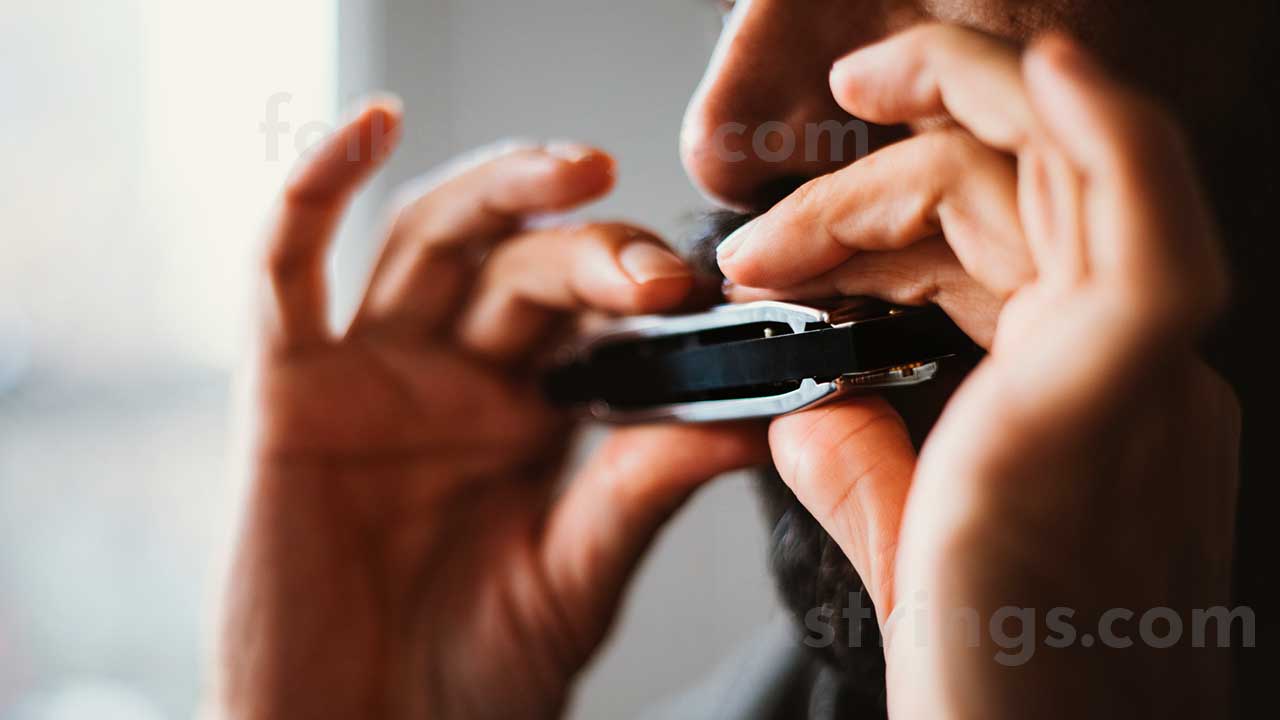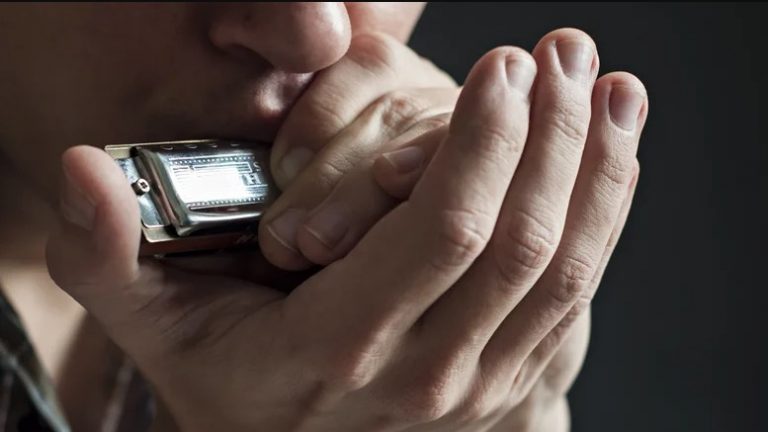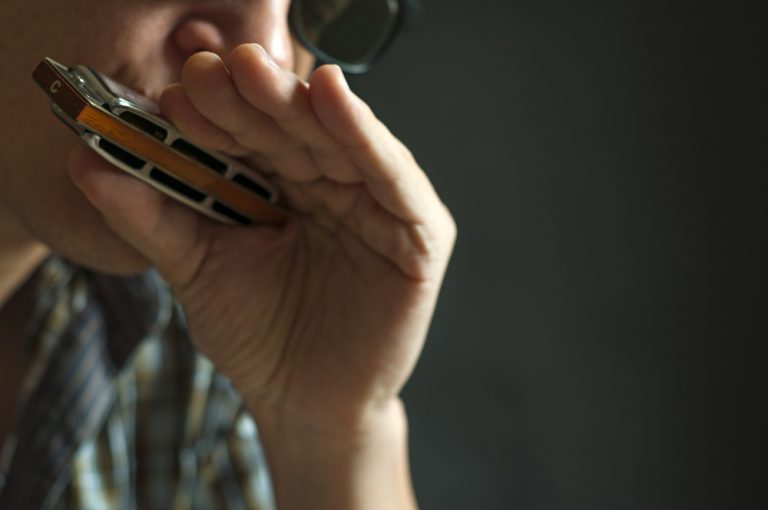6 of The Most Common Harmonica Questions – No Stupid Questions
Folkstrings.com is reader-supported. When you buy through links on our site, we may earn a small commission.
Guess what the best-selling instrument is in the world? Did you pick the guitar? Piano? Drums? Wrong! It’s the harmonica with a whopping three million sales annually!
Harmonica, also known as the “French harp” or “mouth organ,” originated in Europe in the 1800s. It’s one of the most versatile instruments to play jazz, blues, American folk music, country, rock and roll, classical music, and more. It has three types: Asian tremolo, chromatic, and diatonic. Among these three, chromatic is the easiest to play.
Your harmonica needs proper care if you don’t want it to break. Read further to learn how to maintain your instrument, plus other harmonica-related questions you need to know.
Table of Contents
- How to Clean the Harmonica Without Taking It Apart? Step by Step Guide:
- What Is the Best Way to Clean a Harmonica?
- How to Sterilize a Used Harmonica?
- Do Harmonicas Go Out of Tune?
- Can You Play Harmonica with Braces?
- Do Harmonicas Hurt Dog Ears?
How to Clean the Harmonica Without Taking It Apart? Step by Step Guide:
Regular cleaning is critical to keep your harmonica’s sound fresh for years. The washing method is the most manageable and fastest way of cleaning a harmonica. It’s best for beginners and players who don’t have time to disassemble their instruments.
Here’s the step-by-step guide to cleaning your harmonica by washing to remove any accumulation of saliva, salt, chemicals, acids, cells, dust, and other debris.
- Prepare warm water in a bowl or at your tap.
- Wash your harmonica and tap it on your hand with the mouthpiece facing down.
- If your harmonica has slides, press the slides to ensure all the holes are rinsed.
- Repeat 5 to 10 times or until all the dirt is gone.
- Put the harmonica on a flat surface with the mouthpiece facing down, and allow it to dry in natural air. You can also place it in a warm room or before a fan for quick drying.
- For harmonicas with slides (like most chromatic harmonicas), press down on the slide and insert a toothpick into the first hole to guarantee all the water comes out and the combs get air for drying.
Bear in mind that this method is only for waterproof harmonicas or those with plastic and alloy combs. If your harmonica is wood or has no sealing on the comb, you can clean them with a soft and dry brush.
What Is the Best Way to Clean a Harmonica?
Most professionals do a deep or full cleaning to eliminate any build-up. It’s to preserve the harmonica’s sound and avoid damage to the instrument. How often you need to clean it depends on how much you play.
Harmonicas usually need deep cleaning every three to six months. For best results, you must have a regular cleaning schedule and stick to whatever interval you pick. Also, consider that deep cleaning a diatonic and tremolo differs from chromatic.
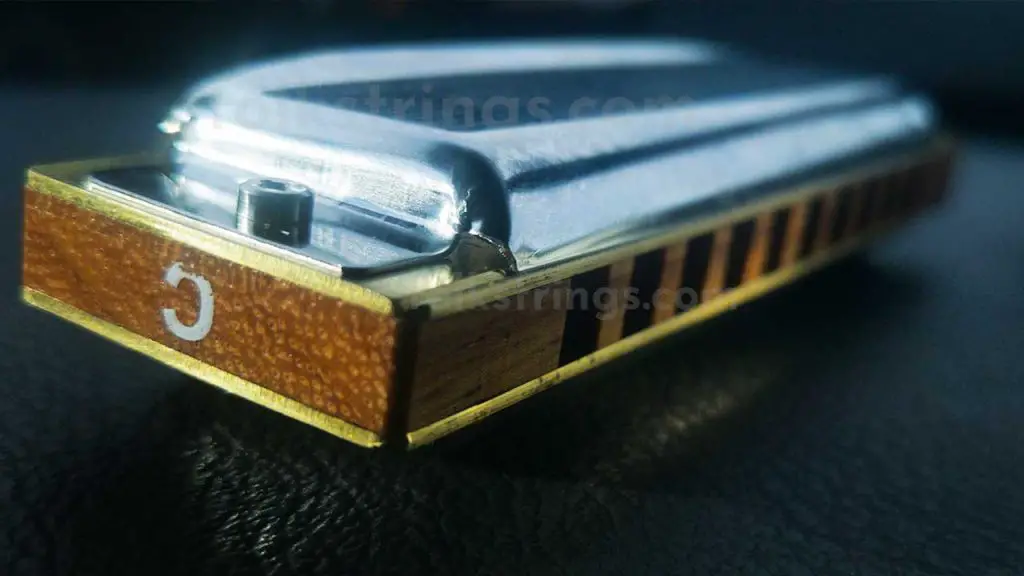
Guide to Full Cleaning a Diatonic and Tremolo Harmonica
- Take a screwdriver that fits the size and type of harmonica screws. Carefully remove the instrument’s cover plates, reeds, and comb. Place the screws in a cup or safe place.
- Clean both sides of the cover plates by wiping them with an alcohol spray and a piece of cloth.
- Make a solution of warm water with vinegar or citric acid in a bowl. Soak the reed plates for 30 minutes.
- Wash the metal or plastic comb while the plates are soaking. Choose between a combination of soap and lukewarm water or an alcohol spray. Use a soft brush to clean the comb.
- Do not use any liquid in cleaning a wooden comb. Use a dry brush instead.
- After soaking the reed plates, use a soft brush and gently follow the reed’s direction, not across it. To avoid damaging or messing up the notes, don’t brush the ends of the reeds.
- Clean both sides and rinse with water.
- Let them dry completely and reassemble the harmonica.
Guide to Deep Cleaning a Chromatic Harmonica
Note: The process below is not suitable for wooden harmonica.
- Disassemble all parts (cover, mouthpiece, slide, flat blank). Keep the screws in one place.
- Grab the comb assembly and run it under lukewarm water.
- Get a pot or bowl that fits the comb and soak it with lukewarm water for two to three minutes.
- Hold the comb facing your hand. Tap it a few times to remove the water.
- Place the comb facing down on a flat and safe surface. Let it dry for about six hours.
- Clean the other parts with a toothbrush, soap, and water. Rinse and wipe them dry.
- Optional: Apply a lubricant to the slides for a quieter harmonica.
How to Sterilize a Used Harmonica?
If you’re confident your harmonica is completely dry after cleaning, you don’t have to worry about germs and other health hazards. But if you want to be extra sure, sterilization is the key to putting your worries at ease.
To do this, spray the harmonica’s mouthpiece, covers, and other outer parts with an alcohol-based disinfectant like isopropanol.
You can also go for hydrogen peroxide. It’s non-toxic, inexpensive, and earth-friendly.
- Soak the harmonica in a bowl with 3% hydrogen peroxide for about three to five minutes.
- Run it under water and rinse well.
- Tap or shake the harmonica in a towel to remove excess water. The holes should face the towel so all the water drains out.
- Allow it to dry for about three to four hours before using.
Do Harmonicas Go Out of Tune?
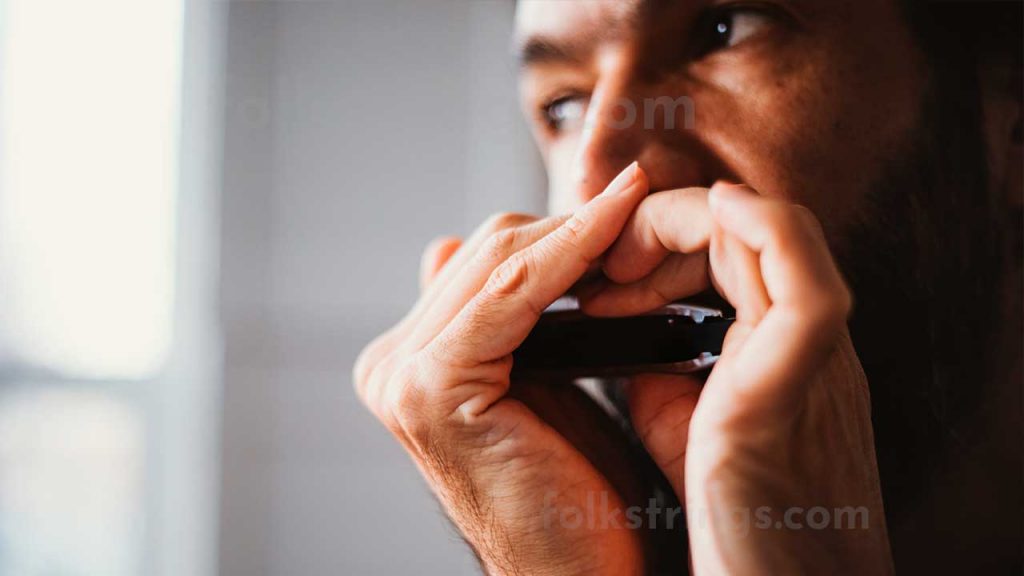
Both brand new and old harmonicas can go out of tune. The most common reasons are:
Cheap or knock-off brand
The best way to see if you have an authentic, branded harmonica is to ask an expert about your concerns.
Here’s a tip: post your questions on a harmonica forum. Many users, often virtuoso players, will gladly check the instrument for you. Just make sure to add photos for easy inspection.
Cracked or damaged reed
A cracked and damaged reed isn’t fixable, but it can be replaced. You’ll need a professional to replace and shape the reed into the correct curvature. Remember that reeds are thin metals sensitive to temperature, and a cold reed will play a different note than a warm one.
Obsolete harmonica
If your harmonica is too old, purchase a new one instead. It’s easier and cheaper than re-tuning.
Cold temperature
To remove moisture spread, warm your harmonica with your hands, arms, or pockets. You can also make a low-cost homemade heating pad.
Beginners blowing too hard
If you’re a beginner just learning to control airflow, be careful not to blow too much to avoid strong vibration. These vibrations can change the harmonica’s curvature, leading to an out-of-pitch note.
Bending a lot of notes
Note bending includes modifying the reed curve. When a player mixes in many notes or plays the harmonica regularly, re-tuning the instrument from time to time is essential.
Can You Play Harmonica with Braces?
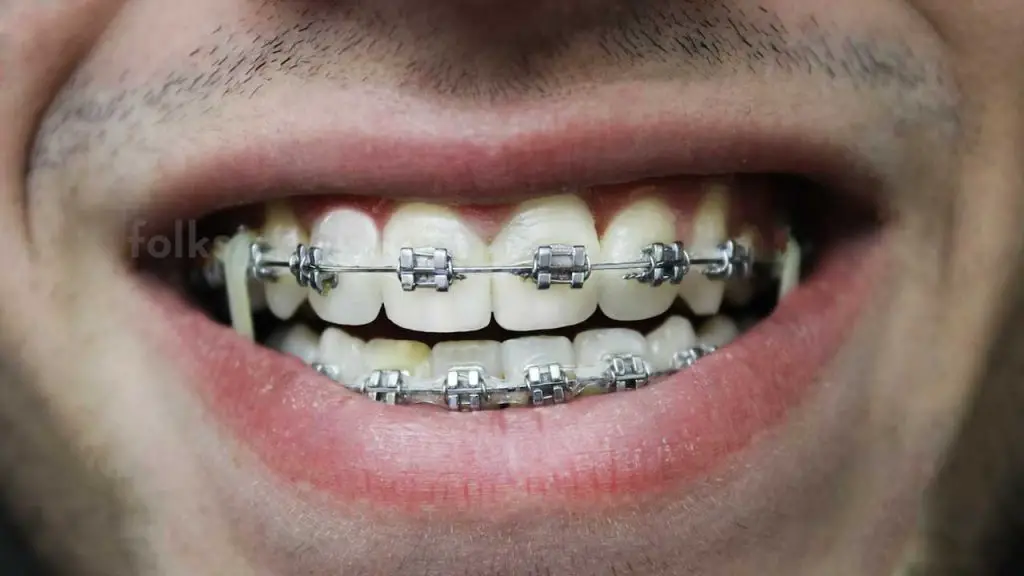
Yes, you can play harmonica with braces. Wearing braces don’t prevent you from learning or playing any instrument that requires using the mouth.
There are two techniques used in playing the harmonica. “Tongue-blocking,” where the tongue blocks other holes and “puckering” or “lip-pursing” to blow a single hole. Both of these techniques work perfectly fine with braces.
Old players who recently got metal braces don’t notice any difference or discomfort while playing. In most cases, beginners find it harder to learn to blow harmonica at first, requiring a lot of time to develop a proper embouchure. Regularly put wax in braces and wires to make your harmonica practices more comfortable and avoid lip irritation.
Do Harmonicas Hurt Dog Ears?

Do your dogs howl when you play the harmonica? Don’t worry. It’s not because their ears are hurting.
Dogs typically have a very good sense of hearing and use it to know what’s happening around them.
Hearing your tone will let them know what you’re feeling. Because dogs are very vocal, they bark, howl, yip, or even growl to communicate with people.
Harmonicas make various tones and pitches, triggering the dog’s howling instinct. They will howl to mimic the sound, interact, or sing along with the melody coming from the instrument.
While your harmonica’s music doesn’t harm pets’ ears, it doesn’t mean your dog enjoys it. It’s why watching your dog’s reaction when you play is necessary. If your dog seems excited, you can relax even though they’re howling. Your dog is enjoying the music and singing to it. But if your dog looks scared and tries to run away the moment you pick up the harmonica, it’s best not to practice when your dog is around.
Author Profile
-
Daniel Johnstone is an English writer with a love for stringed instruments from around the world.
He shares his love for these instruments through his writing for folkstrings.com, a website dedicated to all things related to folk string music.
Daniel's passion for music started at a young age, and he has since become an accomplished musician, playing guitar, cavaco, and recently, the harp.
His dedication to learning and sharing his knowledge of stringed instruments is evident in his insightful and engaging blog posts. Whether you're a seasoned musician or a beginner, Daniel's writing is sure to inspire and entertain you.
When he's not playing music or writing, you can find Daniel exploring new instruments and seeking out new sounds to share with his readers.
Latest entries
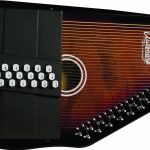 AutoharpApril 4, 2024What Is the Autoharp Made Of: Exploring Its Materials and Craftsmanship
AutoharpApril 4, 2024What Is the Autoharp Made Of: Exploring Its Materials and Craftsmanship AutoharpApril 4, 2024Is Autoharp Easy to Play? Unveiling the Truth for Beginners
AutoharpApril 4, 2024Is Autoharp Easy to Play? Unveiling the Truth for Beginners AutoharpApril 4, 2024What Is an Autoharp Worth? Your Guide to Pricing and Value
AutoharpApril 4, 2024What Is an Autoharp Worth? Your Guide to Pricing and Value AutoharpApril 4, 2024Are Autoharp and Zither the Same Thing? Unraveling String Instrument Myths
AutoharpApril 4, 2024Are Autoharp and Zither the Same Thing? Unraveling String Instrument Myths
Affiliates:
This post may contain affiliate links that at no additional cost to you, the site may earn a small commission. We only recommend products we would use ourselves and all opinions expressed on this site are our own.
Accuracy Advice:
While we strive to provide up-to-date and accurate information, the content in this article may not reflect the most current research or medical guidelines. We encourage readers to do further research and consult with professionals for more personalized advice.
Our Recommendations:
The products and services mentioned in any of our articles are recommended based on our independent research and personal experience. We are not sponsored by any company. We aim to suggest products and services we believe are of high quality and could be beneficial to our readers.

